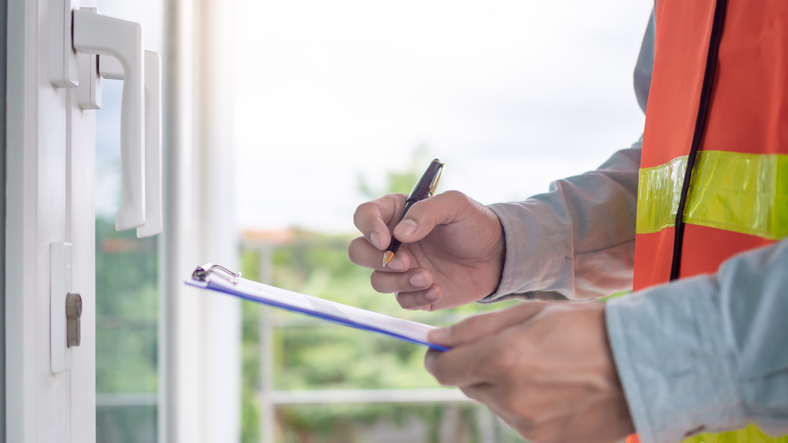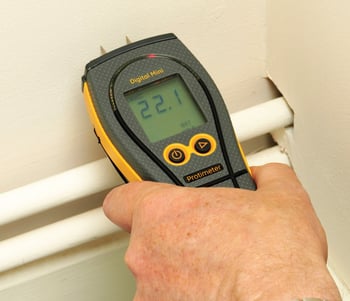How to Use a Protimeter Moisture Meter to Check Damp Within Buildings
Checking damp and moisture within a building structure is a very comprehensive subject. In this guide, we'll go over the basics of understanding of moisture, some of the techniques to look for damp, and how to use a Protimeter moisture meter to diagnose moisture levels.
What is Damp?
Damp is caused by water getting into the property (structural) and moisture building up within the property causing condensation (lifestyle).
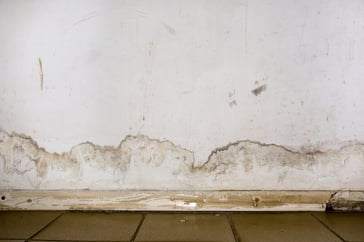
Damp Ingress Into a Property (Structural)
Damp occurs when water penetrates into the fabric of a building. Common causes are:
- Rainwater seeping through the roof where a tile or slate is missing, spilling from a blocked gutter or penetrating around window frames.
- Rising damp due to a defective damp-course or because there is no damp-course.
- Leaking pipes, wastes or overflows. Often you can see damp as “tide marks” on walls and ceilings.
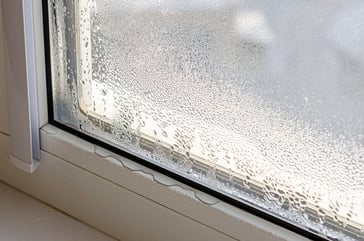 Condensation (Lifestyle)
Condensation (Lifestyle)
Lifestyle moisture issues are caused by normal daily activities (taking showers and baths, washing and drying clothes, cooking and boiling kettles, running a heater during the colder months), all produce warm air containing large amounts of water vapor.
If the warm air can’t escape through an open window or air vent, it moves around until it finds a cold surface where it cools and forms condensation.
Condensation occurs on any cold surface which records a below dew point temperature (the temperature at which saturated air releases surplus moisture vapor). This can be seen on a mirror in a bathroom or a window in a kitchen when cooking.
Differences in Damp Materials + Chart
|
Material |
Moisture content % |
Interpretation |
|
Wood |
4 |
Extremely dry |
|
Mortar |
4 |
Dry |
|
Brick |
4 |
Damp |
|
Plaster |
4 |
Very wet |
|
Wood |
12 |
Air dry |
|
Brick |
12 |
Saturated |
|
Plaster |
12 |
Not possible |
Building materials will absorb different levels of moisture content, some materials, like wood, can absorb more water than brick.
Commonly timber will absorb more water molecules than a brick wall. Wood is like a sponge, absorbing moisture directly from the buildings structure and retaining higher levels of moisture before directly being affected by the damp process.
The following table provides examples showing the percentage moisture and the readings interpretation.
As shown, wood can be classed as dry at 12%, but brick would be saturated at the same reading.
Example:
A timber skirting which records a moisture reading of 12% (air dry), the plaster could be around 0.5% and the brick about 1%. In severe
conditions you may see higher readings of skirting 22%, plaster 1% - 3%
and brick around 2% - 5%.
Readings are taken on a reference scale as it is only a relative degree of dampness. Wood moisture scale (wood moisture equivalent ‘WME’) is the most common and is recognised by professional bodies. Wood is the first material to degrade due to damp.
How to Use a Protimeter Moisture Meter to Pinpoint Moisture Within a Structure
First, conduct a visual check to review the property for any signs of visible moisture damage. When verifying the building's moisture condition, look for discoloration first. This will allow you to target the affected areas first.
Pinpointing the damp is only possible with a professional moisture meter. These instruments can detect moisture levels below levels that are visible or can be felt.
When measuring moisture, take regular readings over the suspected area and mark the boundaries of moisture levels. Develop a scaled drawing of the moisture readings recording the levels within the affected areas to determine the severity.
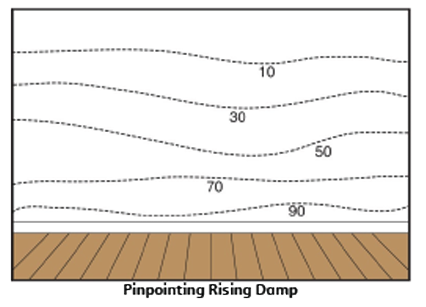
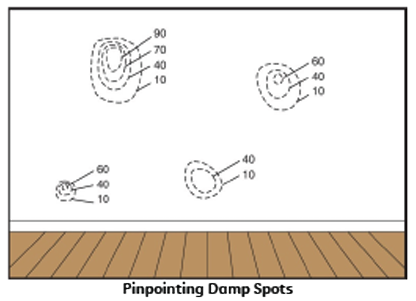
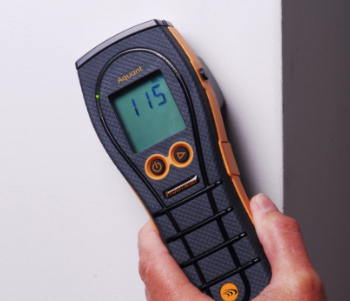
Reliable professional moisture meters from Protimeter are the preferred instruments due to the renowned reliability, accuracy and quality.
Models include the Protimeter Digital Mini (surface moisture) or Protimeter Aquant2 (subsurface moisture). Alternatively, you can combine the two functions by using a Protimeter Surveymaster2 which features both surface and subsurface moisture readings.
Surface Moisture
A pin-type moisture meter, like the Protimeter Digital Mini, can be utilized to measure the surface moisture of a wall, wood, and building structure. Simply place the pins on the surface of the wall to take a reading.
The Protimeter Digital Mini measures using the %Wood Moisture Equivalent (%WME) scale.
 With a pin-type instrument, it may be required to push the pins into the wall. Some types of wall coverings will restrict the reading. But a word of caution, pushing pins into a surface will leave a mark especially on glossed paint, venires and laminated surfaces.
With a pin-type instrument, it may be required to push the pins into the wall. Some types of wall coverings will restrict the reading. But a word of caution, pushing pins into a surface will leave a mark especially on glossed paint, venires and laminated surfaces.
Taking readings in a kitchen or bathroom can be problematic with a pin-type instrument. Floor coverings and tiles will provide a barrier stopping a direct reading with a pin-type instrument. This is where you can use the radio waves of the Protimeter Aquant2 to detect the subsurface moisture levels.
Subsurface Moisture
A non-invasive (pinless) moisture meter will measure the subsurface moisture to a depth of 20mm. This is advised where wall, floor, and wood covering prohibit moisture readings with a pin-type instrument.
The Protimeter Aquant2 will measure using radio waves, penetrating beneath the wall surface including wallpaper, paint, and even tiles. This allows the user to undertake a very quick reading without damaging the surface. The Protimeter Aquant2 can also measure moisture in veneered wood like a built-in wardrobe, kitchen, or fiberglass.
With the Protimeter Aquant2, the moisture level is displayed as a relative moisture level between 0-999 %REL. The lower the reading, the drier the moisture content, higher the reading indicates higher moisture levels.
Moisture Readings
All Protimeter moisture meters will display the readings through a digital LCD display and a simple color-coded LED display.
The digital LCD display will provide the moisture reading (%WME or %REL). When undertaking readings, write down this measurement for future records.
To support the digital reading, Protimeter has developed a simple color-coded LED scale to indicating the moisture condition severity. This provides a very simple way to determine if the readings are Dry, Borderline and Damp.
|
Green - Dry |
Amber - Borderline |
Red - Damp |
|
Air dry moisture content |
Excess of moisture is present. This moisture cannot be attributed to high atmospheric humidity but to a definite source. If the reading in this zone persists or increases, remedial action is needed. Decay likely. |
A serious moisture condition exists and immediate remedial treatment must be effected. Decay inevitable. Any material displaying a red / damp reading is too damp. |
How To Check for Condensation
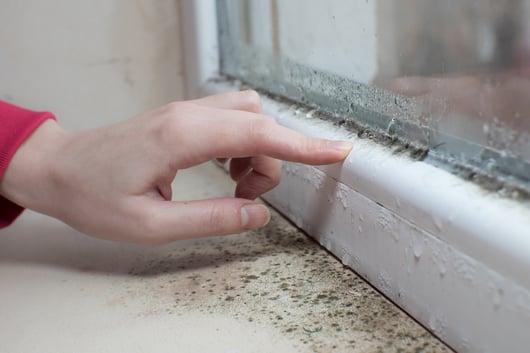 Condensation is caused by high air humidity levels created by common household tasks which produce high levels of water vapor (having a bath, running a shower and boiling water).
Condensation is caused by high air humidity levels created by common household tasks which produce high levels of water vapor (having a bath, running a shower and boiling water).
Condensation occurs on cold surfaces (window, mirror, tiles, glass) where the air-borne water vapor condensates back into a liquid. Condensation is usually an intermittent phenomenon, occurring frequently in winter and at night. Therefore a range of readings will be required throughout the day in all rooms of the property.
When looking for condensation problems, check bathrooms, showers, and kitchens. If condensation keeps occurring in the same place, it can cause black mold growth. The distribution of mold growth can be a useful guide to where condensation is occurring.
If you feel that condensation is a cause for some of the moisture problems, a digital hygrometer will accurately measure the airborne moisture which creates condensation. When measuring humidity, air temperature should be recorded at the same time.
Hygrometers from Protimeter are recommended like the Protimeter Hygromaster 2 or Protimeter Hygromaster L for their quality and accuracy. Measure for levels of humidity first, if high levels are recorded then there will be a potential of condensation occurring in the property.
Measuring Relative Humidity (%Rh)
Air humidity is measured against Relative Humidity (%RH) and is a simple procedure.
When undertaking humidity readings with the Protimeter Hygromaster 2 or L, the sensor is located at the top of the instrument. The standard sensor has a reading range of 30 -100 %RH.
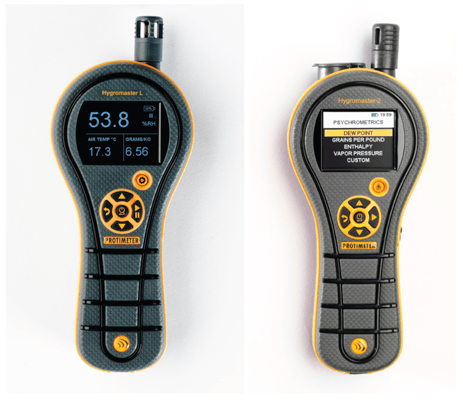
After turning on the instrument, ensure the instrument is displaying %RH and air temperature (TA). The instrument will then read both airborne humidity and air temperature. Depending on lifestyle issues, different measurements will be required throughout the day to develop a pattern when humidity occurs, which room and cause of the humidity.
Internal humidity readings will increase if the outside weather conditions are damp. Any reading over 70%Rh will cause damage to natural materials.
.
|
Low %RH |
High %RH |
|
|
CENTRAL HEATING |
20 |
45 |
|
NORMAL ROOM |
35 |
75 |
|
DAMP |
75 |
100 |
|
OUTSIDE (UK) |
45 |
100 |
The simplest way to record the humidity levels within a property is to develop a spreadsheet recording date, time, room, %Rh, and air temperature. Over the period of a day, a picture of the humidity fluctuations will be seen.
If high levels of humidity have been recorded, it is best to check the surface temperature to verify the potential of condensation.
Measuring For Condensation
Condensation is measured against the dew-point scale and requires surface temperature readings.
Both the Protimeter Hygromaster2 and Hygromaster L can measure for condensation, reporting back the potential of condensation. An optional Surface Temperature Probe accessory is required to undertake this procedure.
By operating the Temp Diff function, the operator will be able to determine if surfaces are colder than the surrounding air temperature, creating condensation.
However with the Protimeter MMS3 instrument, the Condensator Mode enables the user to assess the risk of condensation occurring on surfaces or to confirm whether or not condensation is present on a surface.
